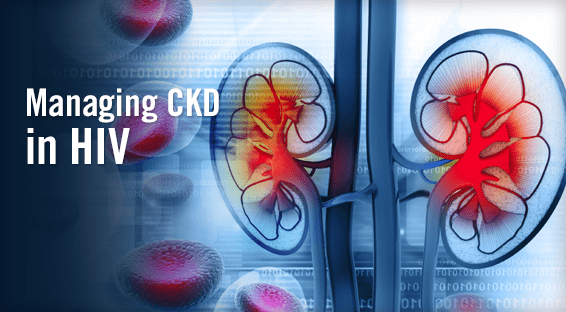Studies indicate that up to one-third of people with HIV has abnormal kidney function. Chronic kidney disease (CKD) in this patient population increases morbidity and mortality risks, making it imperative to recognize CKD early and diagnose its underlying causes. Recently, the Infectious Diseases Society of America (IDSA) published an update to its 2005 guideline for the management of CKD in patients with HIV in Clinical Infectious Diseases.
Important Considerations
The guideline identifies clinically relevant questions for managing CKD in these patients and summarizes data from clinical studies, while offering recommendations for clinical care. Gregory M. Lucas, MD, PhD, lead author of the IDSA updated guideline, says it is critically important to monitor kidney function and kidney damage in patients with HIV. “Currently, kidney function is usually measured using standard blood testing,” says Dr. Lucas. “However, the evidence shows that it’s also important to screen for evidence of kidney damage in the urine. As such, we recommend urinalysis or a quantitative measure of albuminuria/proteinuria at baseline, when antiretroviral therapy (ART) is initiated or changed and at least once a year.”
Since 2005, there has been more evidence supporting the use of kidney transplant among patients with HIV whose kidney damage has progressed to end-stage renal disease (ESRD). “Until recently, most of these patients would have been considered for dialysis, but studies show that they can expect good outcomes following a kidney transplant,” Dr. Lucas says. The guideline recommends that providers assess patients with HIV and ESRD for kidney transplantation, with consideration for each individual’s opportunistic infection history, comorbidities, current immune status, and virologic control of HIV with ART.
Observational data suggest that HIV patients who have lost kidney function are less likely to receive ART when compared with those with intact kidney function. “There may be uncertainty about which medications are safe or concerns that kidney damage will progress to the point that a drug may be overdosed, but effective ART generally slows kidney disease progression,” Dr. Lucas explains. “Also, some HIV medications aren’t metabolized by the kidneys. While some of these therapies are non-traditional, treating patients with one of these drugs is better than keeping them off therapy for prolonged periods because of uncertainty about kidney function.”
Awareness Is Critical
Dr. Lucas stresses the importance of being aware of CKD risk factors. “For patients with HIV, CKD risk factors include African-American race, a family history of advanced kidney disease, diabetes, hypertension, and a history of advanced AIDS or very low CD4 cell counts,” he says. “Early recognition of CKD can allow clinicians to take measures to help prevent progression of the disease. The guideline update can be a valuable resource for clinicians to better manage these patients.”



 Janine Anthes
Janine Anthes